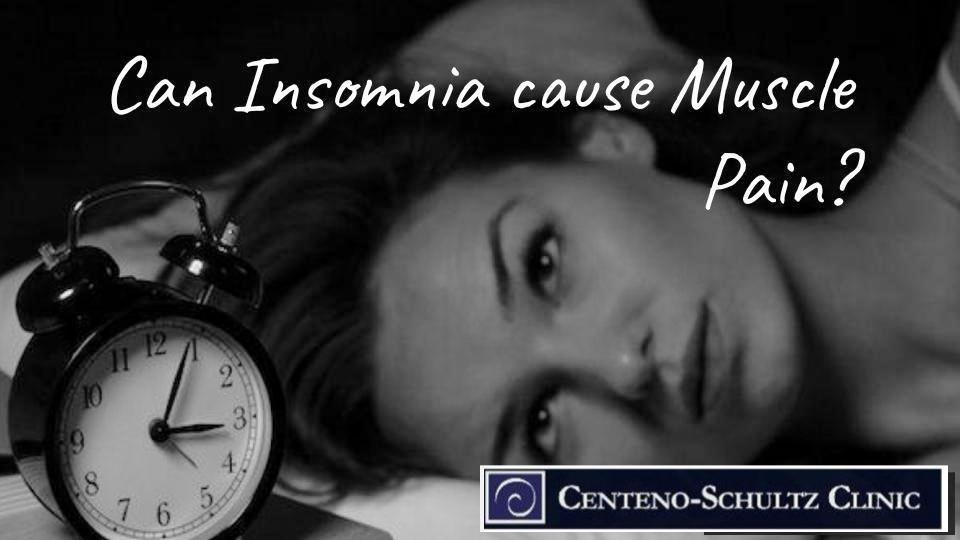It makes sense that if you suffer from chronic pain, you might also be sleep deprived. It’s difficult to get comfortable when something hurts, and for those who have chronic pain, whether it’s muscle pain, joint pain, or anything else, sleep can be a constant struggle. While the natural assumption is that we can’t sleep because we hurt, one study suggests this may also work in reverse and that there may be a link between insomnia and muscle pain. Specifically, for those who have insomnia, this chronic sleep disorder can lead to chronic muscle pain.
Before we take a look at the study, let’s review insomnia.
Understanding Insomnia
First, it’s important to note that having an occasional restless night doesn’t mean you have insomnia. For example, tossing and turning because you’re worried about a test the next day is situational and temporary and probably won’t continue once the object of that worry (the test) has passed. To fall under the true diagnosis of insomnia, your problems sleeping typically have to continue for a month or longer and disrupt your ability to focus and be productive during the day.
A diagnosis of insomnia can stem from a variety of issues, anything from a reaction to chemical substances (e.g., alcohol, medications, drug abuse, etc.) to chronic sickness to life stress (e.g., divorce, loss of job, etc.). Insomnia can be long-term. For example, lasting years in a patient with alcohol dependence. Or it can be short-term. For example, subsiding a few months following a divorce, after life has resumed some degree of normalcy.
When you’ve entered the full-blown insomnia zone, your ability to focus will be significantly disrupted, you’ll feel drained of energy and maybe irritable or on-edge. Insomnia can really affect every aspect of our ability to properly function and make responsible decisions, and insomnia left unaddressed can lead to both physical and psychological health problems. One of those physical results of insomnia, suggested in one study, is chronic muscle pain. Let’s review.
Muscle Pain Due to Insomnia or Insomnia Due to Muscle Pain?
In one recent study, researchers found that both chronic regional (specific areas) and chronic widespread (throughout the body) musculoskeletal pain increased in patients with insomnia. For those who had chronic region-specific pain, the study showed that these patients had pain in not just one region, but in at least three body regions (including neck, upper back, hips, shoulders, and so on).
On the other side of the coin, as we mentioned in the introduction that the reverse, the insomnia and muscle pain connection, certainly makes sense—insomnia or sleep deprivation can be a result of chronic pain—to support this statement, studies have also shown this as well, specifically with sleeplessness resulting from back pain and knee pain. So regardless of which came first, the insomnia or the pain, chronic insomnia isn’t something to be taken lightly, and it’s not something you should be content to just live with. Insomnia may be signaling that there is a more serious condition that came before it, or it can be a warning sign that something may follow, such as chronic muscle pain, which can lead to other issues.
These aren’t the only studies we’ve seen on sleep deprivation and its link to pain. There are many. Another, for example, found that restricting sleep to four to five hours per night caused an increase in the sensitivity to pain as well as a decrease in the tolerance for pain.
Insomnia and Muscle Pain: Examine Your Sleep Patterns and Address Any Pain
So which came first? Your chronic muscle pain or your insomnia? Some of us have lived with both for so long, we simply don’t remember. It does seem for some of us, however, that the key to tackling our chronic muscle pain is to first unlock the door to why we aren’t sleeping. If you are one of those people, investigate what might be causing your sleep deprivation. Here are a few questions to get you started:
- Do you have trouble falling asleep or staying asleep?
- Are you using your computer and other electronic devices before bedtime?
- Are you drinking fluids before bedtime and then waking up for a bathroom break in the middle of the night?
- Do you overload on caffeine throughout the day?
- Are you simply having trouble turning your brain off at night (e.g, due to stress, worry, excitement, etc.)?
With today’s constantly advancing technologies, you can also monitor your own sleep patterns using sleep-tracking devices. Examine every aspect of your sleep cycle, and take the necessary steps (which may require physician consultation) to correct your chronic insomnia and muscle pain, regardless of which came first.
